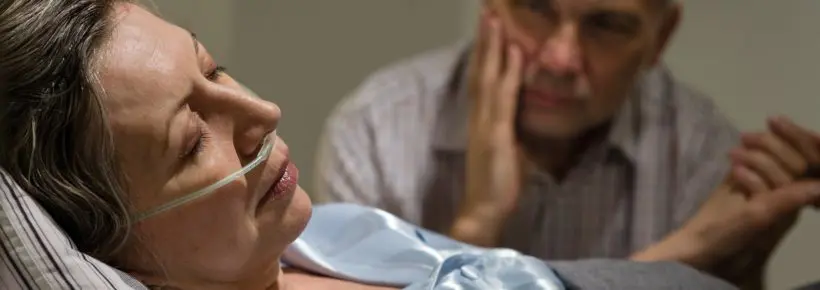Canada Set to Liberalize Euthanasia Law

Intentional euthanasia, whatever its forms or motives, is murder. ― Catechism of the Catholic Church, no. 2324
In the face of the terrible suffering that can be caused by illnesses or depression, a truly human response should be to care, not to kill. ― Canadian Conference of Catholic Bishops, Submission to the Expert Panel on Options for a Legislative Response to Carter v. Canada
At a moment when Canada is on the verge of liberalizing its already permissive euthanasia and assisted suicide laws, several whistleblowers have stepped forward, exposing the unseen dark side of the country’s so-called “progressive” experiment in using death as a “treatment.”
Take the case of Roger Foley, a man who is currently suffering from a degenerative brain disorder. He is hospitalized in London, Ontario. Recently, he became alarmed when staff at the hospital proposed euthanasia to him, even though he had never expressed the slightest interest in it.
Foley was so disturbed by these conversations that he began secretly recording them. During one such conversation the hospital’s director of ethics told Foley that it would cost “north of $1500 a day” to keep him in the hospital. When Foley replied by asking him what the plan was to care for him in the long term, the ethicist responded, “Roger, this is not my show. My piece of this was to talk to you, (to see) if you had an interest in assisted dying.”
“How are you feeling, Rog?” asked another worker. “Are you feeling like you want to harm yourself or anything like that? You can just apply to get assisted—if you want to end your life.”
Foley worried that this seemed like coercion.
Of course, it is coercion. Unfortunately, Foley’s case is only one of several similar cases that have received widespread publicity in recent days. Advocates for the disabled are warning, however, that the cases we are hearing about are likely only the tip of the iceberg.
“It’s difficult to quantify it, because there is no easy way to track these cases,” Catherine Frazee, a professor emerita at Toronto’s Ryerson University, told the Associated Press, “but I and other advocates are hearing regularly from disabled people every week who are considering (euthanasia).”
Another case involves a Canadian Forces veteran who recently reached out to a Veterans Affairs hotline to seek treatment for post-traumatic stress disorder and a traumatic brain injury. According to Global News, the unnamed veteran “was shocked when he was unexpectedly and casually offered medical assistance in dying by a Veterans Affairs Canada (VAC) employee.”
The veteran and his family told Global News that he was seeking treatment for injuries that he suffered while in the line of duty. The family worries that the suggestion that the veteran consider ending his life has harmed his recovery.
Canada and the Slippery Slope
Canada first legalized euthanasia in 2016, after the Canadian Supreme Court ordered the government to pass legislation allowing the practice.
The progressive Trudeau government did so despite warnings from disability rights activists that experience in places like Belgium and the Netherlands shows that once one opens the door to death as a medical “solution,” it’s only a matter of time before the law is liberalized, and more and more people are subjected to pressure to kill themselves.
Canadians were repeatedly assured when the law was passed in 2016 that they would not follow these European countries, and that euthanasia would only be available in strictly limited conditions, i.e., for those with terminal conditions whose death was “reasonably foreseeable.”
Just three years after the law was passed, however, the Quebec Superior Court struck down the “reasonably foreseeable” provision, thus significantly expanding eligibility. In the six years since euthanasia was legalized in Canada, the number of cases has skyrocketed. In 2021 there were 10,064 such deaths, a 32% increase over the previous year.
Meanwhile, just a few weeks ago the Trudeau government approved new regulations that will extend the availability of euthanasia to the mentally ill.
The prospect of a clinically depressed patient being able to request that a doctor kill him, is an irony that is nothing short of macabre. On the one hand, it seems, the government will pay police to do everything they can to stop depressed people from killing themselves, and on the other hand, it will pay doctors and nurses to kill those same people.
Indeed, this bitter irony is already on display in the aforementioned case of the Canadian veteran. According to reports, the Canadian government has increased its investments in mental health services for veterans in recent years, after a rash of suicides during the final years of the Afghan war. At the same time, it seems, healthcare workers with Veterans Affairs Canada are offering to kill veterans suffering post-traumatic stress disorder (PTSD).
Canada, it seems, isn’t simply sliding down the slippery slope, it is flinging itself headlong down that slope.
Euthanasia Inevitably Victimizes the Vulnerable
None of this should come as a surprise to anyone who has paid the slightest attention to how the legalization of euthanasia and assisted suicide has panned out in other countries.
Indeed, in their original statement to the expert panel convened in response to the Supreme Court’s decision ordering the government to propose legislation legalizing euthanasia, the Canadian bishops warned, “The ruling by the Supreme Court of Canada puts at risk the lives of the vulnerable, the depressed, those with physical or mental illness, and those with disabilities.” They noted that they stood with Pope Francis against the “throwaway culture” with its lust for “quick fixes” and “technical solutions.”
In his recent visit to Canada, Pope Francis stated movingly that “don’t abandon us!” is the cry “of patients who, in place of affection, are administered death.”
We must never abandon those who are suffering.
“Euthanasia must be called a false mercy, and indeed a disturbing ‘perversion’ of mercy,” says Pope St. John Paul II, adding that:
True “compassion” leads to sharing another’s pain; it does not kill the person whose suffering we cannot bear. Moreover, the act of euthanasia appears all the more perverse if it is carried out by those, like relatives, who are supposed to treat a family member with patience and love, or by those, such as doctors, who by virtue of their specific profession are supposed to care for the sick person even in the most painful terminal stages. (Evangelium Vitae, no. 66)
True compassion maintains solidarity with those who suffer. “It does not put lethal drugs in their hands and abandon them to their suicidal impulses, or to the self-serving motives of others who may want them dead. It helps vulnerable people with their problems instead of treating them as the problem” (USCCB, To Live Each Day with Dignity).
Disability rights campaigners have persistently noted that no matter how lofty the rhetoric about “mercy killing” or “death with dignity” might be, the inner logic of euthanasia and assisted suicide always leads to the victimization of the vulnerable. As Tim Stainton, director of the University of British Columbia’s Canadian Institute for Inclusion and Citizenship, told the Associated Press recently, euthanasia is “probably the biggest existential threat to disabled people since the Nazis’ program in Germany in the 1930s.”
Those are stark words. But the flood of stories emerging about the lived reality of legal euthanasia in Canada bear them up.
The brutal fact is that it is almost always “easier” and “cheaper” to kill a patient with a difficult condition, than it is to care for him or her. That is why civilized societies founded on the recognition of the inherent equality and dignity of all human beings have always put in place ironclad safeguards against turning to death as a “solution.” However, once death as a “solution” is unleashed, it is impossible to control its voracious appetite.
Anyone with any sense should be able to see that if you combine a financially strapped national healthcare system, overworked healthcare workers, and a rapidly aging population, the likelihood of a predatory abuse of the “quick fix” of euthanasia is inevitable. It is precisely in such conditions that regulations and laws should be passed protecting the vulnerable, and prioritizing resources to get ahead of the temptation to resort to those “quick fixes” or “technical solutions.”
In a recent statement the Canadian bishops pleaded with the government not to go through with the latest liberalizations of the law. “The experience of the Covid-19 pandemic has heightened our awareness of the importance of reaching out to those on the margins of society and in vulnerable stages or circumstances in their life,” they wrote.
Such individuals should not be seen as a burden to society. Rather, through supportive and ongoing care, we as a society must witness to their dignity. Compassion, empathy and regard for one’s neighbour is a responsibility that safeguards and sustains our shared humanity and the common good of the society which we are called to promote.
Let us pray that Canada, and all other nations that have legalized euthanasia and assisted suicide, wake up to the way they are undermining the dignity of the sick and disabled, and exposing the vulnerable to exploitation and despair. Let us also pray that those nations that have not yet gone down this path take warning from Canada’s example. Any “progressive” policy that results in the mentally ill, disabled, and suffering being pressured to take their lives to save costs or save others the “trouble” of caring for them, is clearly the furthest thing from “compassionate.”



This is striking evidence of our throw-away society. If anything or anybody is useless and a drain on our resources, we get rid of the person or thing. I personally agonize over the deaths of my parents which may come close to what I am complaining about here. I always second guess what the family could have done to prolong their existence. I do mean existing only since they were not living in the normal way and bed ridden or hospitalized.